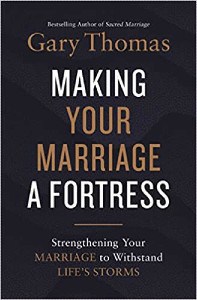John Fuller: (Sound of rain and storm) Today on Focus on the Family, we’ll explore the topic of storms, which can change very quickly and unexpectedly. A light rain could transform without warning into a howling gale. (John’s voice raising to talk over the storm) It’s really damaging, even life threatening. So, your marriage is going to go through storms at some point. The question is, are you ready? (Storm sounds fade)
Thanks for joining us today on Focus on the Family. Your host is Jim Daly. I’m John Fuller.
Jim Daly: Uh, John, that’s a rather dramatic way of putting it, isn’t it?
(laughs).
John: It is, yes. But it’s true, right?
Jim: It is true. And, uh, marriage at times can be a struggle. And, uh, Jean and I have our struggles, too. There are people out there, and we’ll hear from you, I know, that will say, “We’ve never had an argument.” God bless you. That’s incredible (laughs). I think you’re in the one percentile.
But sometimes marriage, you know, there’s, uh, speed bumps that come along and hopefully you’re in a place where you can emotionally, spiritually handle those. And today we’re going to talk with a great guest on how to kind of prepare your marriage for those storms of life.
And let me remind everybody, Focus on the Family is here for you. We want to help you in any way possible. One of the things, John, that a lot of people don’t realize is the treasure trove of resources that exist here at Focus.
John: Mm-hmm.
Jim: I mean, that’s, that’s the golden, uh, nugget here at Focus. Get in touch with us. We have counselors, we have great resources, books and other things, assessments, to help you in your marriage journey.
John: Well, that’s right. And 45 years worth of material is all just a phone call away. Our number is 800, the letter A and the word FAMILY.
Well, our good friend, as you indicated, Jim, and now neighbor, Gary Thomas, is back with us. Uh, he’s a prolific speaker and author of more than 20 books. And, uh, for 11 years he was part of the teaching team at Second Baptist Church in Houston, Texas. Gary and his wife, Lisa, have recently relocated to Colorado. They, uh, serve on the pastoral teaching team at Cherry Hills Community Church in Highlands Ranch.
And we’re going to hear more today about a book he’s written called Making Your Marriage a Fortress: Strengthening Your Marriage to Withstand Life’s Storms. We’ve got details about that book at focusonthefamily.com/broadcast.
Jim: Gary, welcome back to Focus on the Family. Welcome to Colorado.
Gary Thomas: Oh, thank you. It’s been the most pleasant journey here yet, less than an hour on a very pleasant ride with very pleasant surroundings.
Jim: Oh, wait till it snows.
Gary: Yeah (laughs).
Jim: (laughs). That’ll be a five-hour journey. Anyway, hey, let’s get into it. You have written some incredible books on marriage. Uh, I would say you’re the foremost expert on marriage. I hope your wife, Lisa, is happy.
Gary: (laughs).
Jim: That’s the proof of you putting-
Gary: You see me wince there when you say that (laughs).
Jim: We’re going to call her in a minute and make sure. No, it’s so true though, huh? Jean and I always talk about that. It’s tough to be in that marriage space where you’re the expert and then you and your wife have an argument and you’re thinking in the back of your mind, “Wait a minute, this can’t be happening to us.” Does that happen to you? (laughs).
Gary: Well, the… What’s been a blessing, because people often ask, Lisa, “What’s it like?” And she says, “Well, it’s made it easier for me.” She goes, is he really does live out what he writes about except for one book. And we talked about it, Every Body Matters. She thinks I could do a better job eating a little more healthily than I do.
Jim: (laughs).
Gary: But as far as marriage, she seems to give me at least a passing grade.
Jim: All right. Now you made the rest of us feel better-
Gary: (laughs).
Jim: …when we eat that In N Out burger. (laughs). All right, let’s get into it. Explain, uh, the idea of storms in a marriage. I get it generally, but, um, you know, I understand it, it’s related to your experience of surviving that hurricane down in Houston.
Gary: Well, yeah. It happened in 2017. And I think a lot of people can relate to this. We’d been in Houston for seven years at the time. And every time in the fall, you have the signs blinking on the freeway, hurricane season is here, get your prepared kits ready and all of that. And, and the first few years, we take it seriously. We’re from Pacific Northwest. The thought of a hurricane is terrible. After four or five years, you’re like, yeah, yeah, I’ve heard that before.
And then 2017, they said this big thing, Hurricane Harvey is coming. And it hit and it wasn’t that big of a deal at first. But then it moved a little inland, camped over Houston and dropped over 50 inches of rain in three days. It felt like Noah’s flood. I mean, it was just like… It just didn’t stop. The water keeps coming up and up and up. And that point, we see it coming into the yard and I’m like, okay, I got to take this seriously. I go in the garage. This is so pathetic. All I had was cardboard and blue painters’ tape-
Jim: Oh great.
Gary: …which doled out flood water.
Jim: (laughs).
Gary: You know, carry a gallon of water in a paper bag and you’re going to have just as much luck. And I realized, you know, just because the storm didn’t come last year or the year before, the year before, the year before, people who are from that area of the country know eventually it is and you need to be prepared.
And I think same thing is true for marriages that, yeah, just because it has only happened to your neighbor or you haven’t seen it this or that, just the way that life works, even for believers, and sometimes I think especially for believers, the storm is going to hit. And at that point, will your marriage be part of the problem or part of the solution? And that’s why you want to prepare.
Jim: No, and that’s a great analogy. And I know that feeling. Here in Colorado, we get the snow reports and an inch falls when they said 12 inches was going to fall. So, I totally relate to that. But, um, you say these storms will reveal one or two truths about a marriage and a couple. What are those?
Gary: All of these couples, the one thing that they had in common, and I was so inspired by their stories, was that they never imagined that they would have to face the depth of pain and struggle that they faced. They were all caught by surprise. But secondly, that God is faithful. And not theoretically. God says he’s going to be faithful.
In fact, I think there are two verses that have really come true as I’ve written this book and think about it and speaking on it. Psalm 9:10 says, “Those who know your name trust in you, for you Lord, have never forsaken those who seek you.” There hasn’t been a single person who seeks God, that God has forsaken.
And then Jesus’ almost fierce promise, but comforting one. “In this world you will have trouble, but take heart, I have overcome the world.” (John 16:33) Every couple found that to be true. They did face trouble, but when they found… sought refuge in God, they found refuge, a new relationship with God and a new relationship with each other.
Jim: Yeah. And, and we’re going to cover in more detail. I think one of the great, uh, breakdowns in marriage can be those expectations, especially early in marriage, where typically husbands are caught off guard because they didn’t know they were supposed to know so many things…
Gary: Right.
Jim: … that she was hoping he would remember to do or whatever it might be. Speak to that expectation problem, which the earlier a couple can figure that out, I think the better their marriage is going to be.
Gary: Yeah. Well, it’s not just the expectations we have of our spouse. I think it’s the expectations we have of God and ourselves.
I think of one couple, Darryl and Stacy, a wonderful godly couple. Stacy came from a dysfunctional childhood. And so, she really wanted a strong guy who would take care of her. Darryl was a weightlifter. He could bench press 400 pounds. His expectations were, “I’m going to be there for my wife, physically, I’m going to protect my wife, I’m going to be carrying in the groceries or whatnot.”
Three years after they were married they got the diagnosis of MS on the part of Darryl. So really what motivated Stacy to get married, I want a strong man who’s going to make me feel secure, who will take care of me, would never come true. She had to completely die to those expectations. And Darryl thought his relationship with Stacy would be, “You can count on me, I’m going to be there for you, I’m going to take care of you,” and now he says decades later, she takes care of me.
And talking to him even more recently, uh, is amazing. Stacy said, “When I married Darryl, I thought I would just bask in the glow of Bubba,” because he was… Obviously as a weightlifter, he was a big guy, but charismatic, loved the Lord, great with kids. I mean a really, really good guy. And today, Stacy says, “He’s marked by humility like no other guy I know, because MS has humbled him.” You know, he goes from the walker to the wheelchair, to the scooter, to the electric, you know. And she goes every time he responds with more humility. So, she thought he would impress people with his strength. God decided he’s going to have… No, Darryl, you’re going to impress people with your humility, which only would’ve come through the severe road that they walked together.
Jim: Well, and the other part of that is how Darryl embraced what God’s journey for him is. I mean, that, that’s, that’s the humbling part, that he didn’t walk away from the Lord in that respect. He said, “Thank you Lord, and let’s move on.” I mean, that’s, that’s amazing.
Gary: It, it wasn’t easy. I love it. He said when he was first diagnosed, because he, he, he was an athlete, he thought of himself that way. He said, I had one, two-word prayer, “Heal me, heal me, heal me, heal me.” And he just kept praying. And, and who wouldn’t?
Jim: Right. Sure.
Gary: You know, in your 20s facing this, until God finally said to him, “Darryl, I am going to heal you, but not of MS. I’m going to use MS to heal other things in your life.” And it ended up being the pride.
Jim: Wow.
Gary: And, and here’s where… I was just blown away by the wisdom of some of these couples. This is hard won wisdom. Darryl talked about getting into bed at night. So, he gets his chair right up to there. He still has use of his arms somewhat, so he can lift his body onto the bed, but he can’t get his legs over. And so, Stacy has to lift up his legs and move them over onto the bed. And he said to me, “Gary, I’m, I’m tempted sometimes to say, why bother? I’m just going to let Stacy do everything. I’m only doing a little bit.” And he goes, “But I was really challenged.” He says, “I, I think I could probably physically only do about 20% of what I used to do.”
Jim: Wow.
Gary: But I’ve been convicted by God. I want to do 100% of that 20%.
John: Hmm.
Gary: And, and so often when couples go through challenges, they just give up. Well, if we can’t do everything we wanted to do, let’s just go into early retirement. And I was able to use… This has been life changing for me with a, a man who went through prostate cancer and had his prostate removed. And that can have real issues and physical intimacy or whatnot. And it’d be so easy to say, well, we can’t do everything we used to do, so let’s just learn to go without. And I could share Darryl’s hard-won wisdom. Okay, maybe you can only do 30% of what you used to be able to do, but do 100% of that 30%. Don’t take away more-
Jim: Yeah, that’s a good word. Yeah.
Gary: …than life takes away. And maybe it could be a financial calamity, not just health where we can’t afford to do the resorts, we can’t afford to go to the Michelin three-star restaurants. But don’t say then you’re never going to go out, do 100% of what you’re able to do. And that’s the humility that was carved out of decades of seeing their expectations crushed. Um, but the surprise they found, not surprise, but God was there in their greatest fears.
John: Well, that’s Gary Thomas on today’s episode of Focus on the Family. And, uh, what, what great content he’s captured! Uh, so much of it is in the book, Making Your Marriage a Fortress. And, um, we’re talking about storms and staying strong. Get a copy of this book for your own use or to pass on to somebody you know, who is really struggling. We have the book at focusonthefamily.com/broadcast or call 800 the Letter A and the word FAMILY.
Jim: Gary, one of the things I like in the way you structured the book is you’re pulling on a lot of stories from various couples that people can see their own lives in. And I love that. The next one was, uh, Baron and Christie. And he was in the Navy, chaplain in the Navy. He was deployed for three to six months at a time. The classic relationship distance issues. Describe what they were dealing with and how they, how they sorted that out.
Gary: Well, he still is. And, and Baron is a soldier through and through. He was a Marine before he became a chaplain. He often serves with the Special Ops guys, which are… you’d look at him, you don’t know they’re in the military, but you know, you don’t want to go down an alley with them. I mean, these are, these are-
Jim: Well, they’re on your side of. I’m okay.
Gary: (laughs). Yes, they’re on your side. You have no, no true, true friend. And so, it’s just, just some valuable lessons. And so, this is maybe if, if you have a long deployment in the military or maybe you’re traveling for business or whatnot, some of the lessons they thought were very helpful is that they talked about leaving, they didn’t talk about reentry. Um, and, and they just learned.
And this is what I love. All the stories of these couples. And this is what I love about marriage by God’s design. We have time and commitment to get it right. None of these couples say, oh, we’re just unusually wise, unusually connected, unusually mature. They share, yeah, we messed up here and here’s how we messed up. And Christina knew that Baron likes a clean house and a clean car when he comes home. And so, she cleaned the car, but she forgot the steering wheel. And the steering wheel was sticky.
Jim: (laughs).
Gary: She says, “Well, I did everything, but the steering wheel.” And Baron says, “Well, in the Marine Corps, sticky is sticky and sticky isn’t clean and…” Um, but this is where you have to talk about it as a couple, because I, I traveled a lot when the kids were younger without Lisa, because she had to be home with the kids. And rather than having the house clean, I just wanted peace and quiet. I’d been in front of groups, I’d been talking to people all day, I just wanted to chill out and have a relational time. But Lisa thinks… her love language is cleaning, acts of cleaning (laughs). Add that one to Gary Chapman’s.
And, and so I’d come home. And, you know, it’s always a rush to get the kids to bed. So, she’s furiously vacuuming and wiping and I’m like, “Honey, I don’t see the crumbs. I’m not inspecting the floor. I just really want to relax and say hi to you and say hi to the kids.” And, and so what, what Baron wanted isn’t what, what I wanted and it might not be what someone else’s wife wants.
But what I learned from their experiences, talk about it, and then talk about it some more. So often we have these expectations of our spouses, but we don’t tell ’em, but we still hold them accountable to it. And they learn to make it work. Look, we just… What does it mean for you? You’ve been home with the kids, I’m coming home, how do you want the reentry to go for you? And then the wife or the husband, whoever’s staying home, the other spouse is coming, okay, what do you want for your reentry? And you might have to juggle it and compromise. He found out as a young soldier, particularly coming home after a long while, it was much better for he and his wife for them to spend a night or a few nights alone before they got together with the kids.
She also said, you know, the kids are all over him and they soak up all his emotional energy. And so, by the time we get them in bed, I got a very tired husband. And so, they really focused on, on coming back together.
Another major lesson that I found really helpful… Baron, talked about one deployment where he was available, but he was meeting with other chaplains. It was a training thing. And so, three or four nights, brothers in arms, they’re having a great time, they’re laughing. And then Christina started to say, “Hey, Baron, we haven’t connected for three or four days.” And he said, “Gary, I realized I would never go out three evenings in a row if I was home and not be connecting with Christina.” So just because I’m on the road, I’m still married, and I have to act like a married man on the road. And so, they were intentional about, “You know what? Just because you’re on the road or just because you’re the one at home, you still need to make time for your spouse.” They’ve learned being in the military that if you aren’t intentionally connecting while you’re on the road, you learn how to live separate lives. And if you learn how to live separate lives, you become comfortable with separate lives. And that is a gateway to divorce.
Jim: Yeah.
John: Yeah.
Jim: Those are so many good lessons in that. I mean, one of the things is create a communication pattern. I try to call Jean at least once during the day when I’m traveling. It’s usually two or three times when I have a little break. I probably bug the daylight out of her
(laughs)
Jim: “Hey, what are you doing?” “Didn’t we just talk an hour ago? I’m not doing much more differently now.” But, uh, it’s just good to stay connected. You, you kind of refer to that I think as focused communication. I don’t know if that fits the-
Gary: Yes. No, it was perfect. And Christina really stressed this, because she has a friend whose husband is a pilot, and he didn’t do that. Well, she goes, “I’m talking to him on the phone, and I can tell I have about 10% of him. He’s watching a game, he’s watching Sports Center, he’s…” And so, what… My conclusion was, look, if you know you only have 10 minutes of solid conversation, give your spouse, your husband and your wife, the full 10 minutes. That’s why I like FaceTime, because you can’t cheat (laughs).
Look at each other face to face. And it’s better to say, “I’m yours for this amount of time and then, you know, I, I’m tired and I got to go off.” And, and one woman said her, her husband would call her when she was at work and, and she would just be up front, “Hey, babe, I’ve got five minutes before I have to be in this meeting, but I’m all yours for five minutes.” And so, she would listen and engage. And I think that’s where, just be intentional when you are communicating and then just admit when you’re at the end.
For Baron and Christina, high-low was really helpful to set up their conversation. What’s the high point, what’s the low point, because by the end of that, he was, he was pretty tired. I mean, it’s a demanding job that he faced. He could see people die. And, and Christina was empathetic to that, that she wanted to be connected to marriage, but also have empathy that my, my spouse is doing a good thing, serving our country, and ultimately protecting our family.
Jim: Mm-hmm. Right. Well, the pilot example, I was thinking you were going to say while he’s flying the plane, he gives her about 10%.
Gary: (laughs).
Jim: And I was thinking that’s a good thing if I’m on the plane with him, I, I don’t mind 10%.
John: Yeah.
Jim: (laughs). Let’s move to, uh, the other couple, another couple, Keith and Roxanne, that you mentioned who brought, as you described it, quite a bit of baggage into the relationship.
Gary: Yes. Yeah.
Jim: I think, you know, many couples, it may not fit exactly the definition of this couple, but when you bring childhood wounds and things into the marriage, boy, you have got to deal with that stuff.
Gary: Yes.
Jim: Describe what Keith and Roxanne, what they brought in the marriage and how it unfolded.
Gary: Well, first, a word to wives. Um, so often wives think, “If my husband is cheating or he’s looking at porn, what could I have done? Am I not keeping myself up? Am I not active?” And every husband insisted, and, and Keith was among this, there’s nothing my wife could have done to stop me from cheating.
Jim: That’s not the issue.
Gary: This is not about her; it was entirely about me. In fact, he said, “Roxanne was my perfect wife. And because I thought she was a perfect wife, I thought I’m certainly going to lose her when she finds out the real me. And so why don’t I just get it over with, act so outrageously that it’s like pulling off the band aid and getting it done.” But for Roxanne, her father had been unfaithful to her mom, and so she just had these real deep wounds and a lot of insecurity. That’s understandable.
Keith grew up in a family where he was not brought in as part of it. He always felt left out. Then he was molested as a young boy. And a counselor in Houston that I often go to for these issues told me, “Gary, whenever a client comes to me and says that this happened to him as a young boy, he goes, I wait for the dominoes to fall.” He goes… He’s not excusing it, he goes, but it’s such a deep wound.
And so, when you have that kind of baggage where there was just no connection relationally with your family, all of this happened before you met Roxanne, before he married Roxanne. Roxanne had nothing to do with it. Because he didn’t deal with that baggage, marriage, I’ve found as a pastor, gives guys about a nine to 12 month pause. In the freshness of marriage, a lot of those old things go away. But eventually, if they’re not dealt with, they’re going to come back.
And so, it’s about getting strong so that you can be strong in your marriage. Roxanne couldn’t cure or help or heal Keith. He needed a professional. She’s not a PhD counselor. And so, it’s just… What I say is if you have some hurts, maybe kids laughed at you or bullied you a little bit, maybe you’re fine to, to talk with a pastor and, and receive spiritual care. But when you have the level of hurt that Keith had, and I think that Roxanne had, you need a professional. You know, I can brush my teeth, I can’t give myself a root canal.
Jim: Right. It’s really fair, we often demean that in the Christian community, because we think, well, really all you need is God.
Gary: Yeah.
Jim: And, of course, that’s true. If the Lord can wipe that slate clean, that’s wonderful. That’s not typically what happens. Going all the way back to your first story, God puts us on journeys to learn things about ourselves and about the world around us. So, I, I love that encouragement to get, get good Christian counseling, I would say.
Gary: So I think with couples, when you’re, when you’re looking at your childhood hurts, instead of just saying, “Oh, it makes me so angry when he does this,” or when she disrespects me. Like I, I want to say, why does this make you angry?
Jim: Yeah.
Gary: Why does this make you feel so disrespected? Why are you so sensitive to this or that? It may not, it might be what your spouse is doing, but it might not be. It might be what your dad did, what your mom did, what your siblings did. It’s just recognizing that we bring a lot of baggage into our marriage, and, and I don’t want my wife to have to carry it. That’s where I need to go get help and say, “Can you unload this?” so I’m not just dumping it on my spouse.
Jim: You know, so often, Gary, temperament plays into this, and it could be either the husband or the wife. Either one can be very pro counseling, the other one not so much, because for some, it marks failure that I’m not measuring up. Uh, all those performance issues. It’s not about that. It’s about getting healthy. And so, I just want to encourage people to remember that and try to break loose of that to make your marriage all that it can be.
Right at the end here, the impact of isolation in a marriage.
Gary: Ah…
Jim: And it fits with this story, I think. But the, um, the isolation in marriage can really wreak havoc on that relationship, both in a male expression of that, because we as men tend to pull in and, and go the way of the little boy. We don’t want to deal with it, we don’t want her harping on us. I don’t know what to do. I don’t know how to fix that in me. So, we just pull in.
Gary: Yeah.
Jim: And we go news, weather, and sports. Right?
Gary: Right.
Jim: And then for wives, I mean they find it in, I think, in other activity, girlfriend activity. They get distracted and you end up isolated. Speak to the verse and proverbs that you mentioned in the book about the, the downside of isolation.
Gary: Yeah.
Jim: You may… To me it feels like it’s a medication, but it’s medicating in the wrong way.
Gary: Absolutely. Proverbs 18:1 says, “Whoever isolates himself seeks his own desire, he breaks out against all sound judgment.” Keith felt like his downfall into affairs was fueled largely by isolation. He didn’t deal with feeling isolated from his family of origin. And so, he felt the same thing in his marriage and always thought he had to look outside of his family to do it.
But there’s couple isolation too, Jim. I think of the couple that lost their only child. Now, to me the thought of losing any child is beyond devastating. They had difficulty conceiving. So, they just had one. He died at 19. And she said the next morning their house was filled, because they really were in a strong church, and they gave themselves over to small groups. She grabbed the lapels of one of her closest friends and said, “I know, I’ve read the statistics, 70% of couples won’t survive this. Please don’t let us get a divorce. I’ve lost my son. I can’t bear the thought of losing my husband.”
And I think isolation is sort of like… Well, it’s… Let me give a plug for… It’s like Focus on the Family. Publishers say they want books that are Tylenol not vitamins. And what they mean by that is if you have a headache, I need this. Vitamins are supplements for long term health, and they don’t seem as urgent. I bet when people are going through an affair or a kid is rebelling or things are crazy, they’re listening to 10 Focus on the Family episodes.
Jim: Well, I hope so (laughs).
Gary: (laughs). But, but this is why you need the supplements as well. Because if you wait until the crisis hits before you try to gain the wisdom, or before you’re part of a church group, they wouldn’t have had anybody to call. When things are going well, you don’t think you need church. It’s like an obligation. Well, we should go, it’s Sunday. But if you know the storms are going to come, you’re going to say, we need to be a part of a church. The day will come when we need them, and the day is here when somebody needs us. And it was real lesson. I, I…
And I think if you look at scripture reading, prayer, bible study, listening to Focus, those are just wise things. Taking your vitamins to gradually become stronger as a person and as a couple. If you know, the storm will hit, and it will, get the wisdom now so that you can draw from it. Not be like me with cardboard and blue painter’s tape trying to hold back flood waters, which is worthless. I just didn’t have the resources. I didn’t gather them ahead of time, and that was foolish.
Jim: Yeah, yeah, I hear you. And what you’re saying is on the sunny day, get the sandbags ready-
Gary: Yeah.
Jim: …because you’re going to need them tomorrow.
Gary: Yeah, absolutely.
Jim: Well, Gary, this has been so good. And again, I just respect the depth in which you write on this topic of marriage. And every book that you’ve done on marriage is just a powerhouse and it’s so full of wisdom for couples. And this one hits the mark once again. And I just hope people will respond. Uh, even if you’re in a healthy place with your marriage, it’ll be healthier.
And maybe, you know, people in your church or family members that need a copy of this great resource that Gary has written.
Get in touch with us, like we normally say, uh, if you can donate to the ministry, if you could become a monthly sustainer here at Focus, that’d be great. One time gift is good too. And we’ll send you a copy of the book as our way of saying thank you. And if you’re in a tough spot, we get it, we want to get the resource into your hands. So just let us know and we’ll give you the book.
Uh, also, um, uh, just to highlight one of those areas that we can help you with. Hope Restored is our marriage intensive. It is a terrific program. These are broken marriages. Uh, many of them have already signed divorce papers. And the data is really strong. And we go back to these couples two years after they’ve been involved in the four-day intensive, and over 80% are doing well and still married. So, if you’re in that spot and you’re desperate and you don’t know what to do, give us a call and let’s take a look at whether Hope Restored is something, uh, that is good for you.
And other than that, man, pray for us, pray for the marriages in this country. When you’re looking at what’s the core problem with most of what we’re dealing with in this country, it’s the breakdown of marriage.
John: Yeah. We have so much here after 45 years, uh, of ministry that God has allowed us to offer to you. We’re a phone call away. Our number is 800, the letter A and the Word family, uh, 800-232-6459, or stop by focusonthefamily.com/broadcast.
Jim: Gary, we’ll come back next time and continue the talk.
Gary: Looking forward to it.
John: And we hope you’ll join us next time. On behalf of Jim and the entire team here, thanks for joining us today for Focus on the Family. I’m John Fuller, and we’ll see you next time as we once more help you and your family thrive in Christ.






















